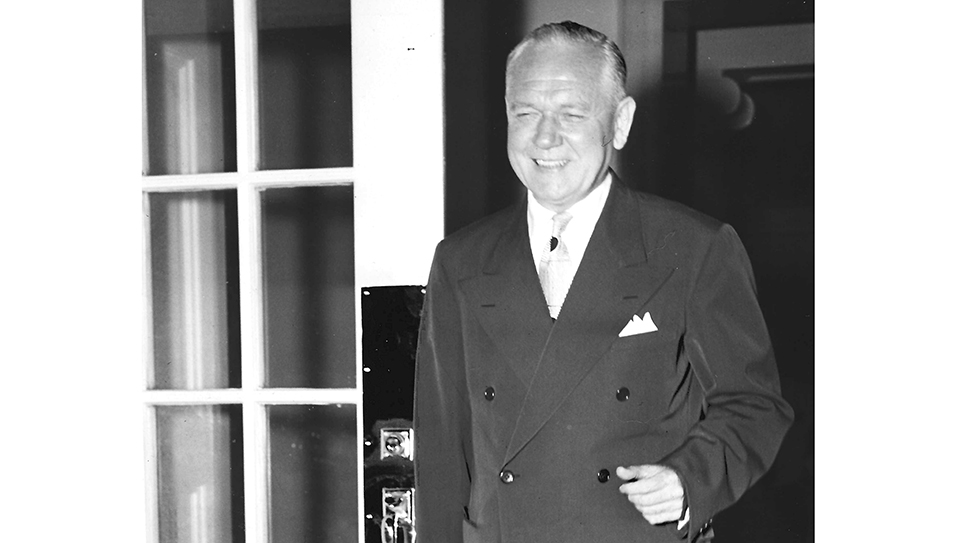By Ray Hill
Cordell Hull, Secretary of State under Franklin D. Roosevelt, had simmered for years with resentment due to having been marginalized by the president. Yet Roosevelt depended upon Hull’s reservoir of good will with both the Congress and the American people. Cordell Hull was an integral part of selling any controversial aspect of the administration’s foreign policy. The Secretary of State commanded enormous respect and prestige from both the public and the Congress. Prior to the bombing of Pearl Harbor and America’s entry into the Second World War, it would have been almost impossible for President Roosevelt to have sold revisions to the Neutrality legislation previously approved by Congress without the aid of Secretary of State Cordell Hull. The isolationists in Congress constituted a powerful bloc of votes and the American people were wary of European entanglements. Revising the neutrality legislation had been difficult enough for the Roosevelt administration even with Hull’s help.
Secretary of State Hull bore a profound dislike, if not hatred, for Under Secretary Sumner Welles. A man of icy demeanor and no little arrogance, Sumner Welles was not an easy man to like. Yet Franklin Roosevelt had known Welles since the latter had been a boy; in fact, a twelve-year-old Sumner Welles had been a page/ringbearer at Roosevelt’s wedding to his wife, Eleanor. It had been Franklin Roosevelt who had advised Welles to pursue a career in the foreign service when Welles had graduated from Harvard University.
Unfortunately, Welles had accumulated some powerful enemies along the way and human frailties all too often become fodder for one’s enemies in politics. Sumner Welles had a fondness for alcohol and apparently while under the influence of alcohol, Welles had a tendency to make sexual advances to men of color. It had been documented Sumner Welles had propositioned several Black porters on the train following the funeral of Speaker of the House William Bankhead. Affidavits had been collected from the porters by Ernest Norris, president of the Southern Railway line, and provided to R. Walton Moore, a former congressman from Virginia and Counselor to the Department of State. The seventy-eight-year-old Moore had desperately wanted to end his career as the Under Secretary of the State Department, a post apparently promised to him by his friend Cordell Hull, but President Roosevelt had appointed Sumner Welles instead. Moore gave the affidavits to William Bullitt. FDR had dismissed the episode and ordered the affidavits be locked deep in the bowels of the FBI’s vaults.
The president reckoned without the fury of Secretary of State Cordell Hull. Bullitt also spread the rumors about Welles far and wide throughout official Washington, making a point to share the information with Vice President Henry Wallace. More importantly, Bullitt briefed the Secretary of State. Hull summoned J. Edgar Hoover, director of the FBI, to his cavernous office in the State Department building. The shrewd Hoover told Hull the reports and affidavits were locked in a safe in the White House. Hull obtained copies of the reports, reputedly from President Roosevelt’s military aide, General Edwin “Pa” Watson.
After reading the reports, Hull flatly demanded the resignation of Sumner Welles, but FDR was intent upon keeping Welles in the State Department. When Bill Bullitt attempted to press Roosevelt into firing Welles, the president reportedly snapped, “There were two men who appeared at the Pearly Gates before Saint Peter. The first was Sumner Welles who confessed to his misdeeds and was admitted into Heaven. The second was Bill Bullitt who also confessed, but Saint Peter said, ‘You have betrayed a fellow human being. You can go straight to Hell.’”
Roosevelt dismissed Bullitt from his office and not only gave him no other post in his administration but also never saw him again. Nine days after FDR sent Bullitt packing, the New York Times printed a story about the feud between Hull and Welles. The crafty Hull, noting the Times story and knowing full well of his own prominence in the Roosevelt administration and prestige in the country, pressed his advantage. Hull told Roosevelt could accept either his own resignation or that of Sumner Welles. Nobody knew better than Cordell Hull that President Roosevelt simply could not afford to lose him. Roosevelt was torn; he wanted Welles to undertake a special diplomatic mission to Moscow, but Hull had picked his moment shrewdly. The president had no alternative but to let Welles go. The New York Times had once written of Sumner Welles the Under Secretary “had enough dignity to be Viceroy of India…” That dignity was in shreds when Welles left the State Department and retired to his Oxon Hill estate. Time magazine had once summarized the rivalry between the “grave, saintly Hull” and Welles. The news magazine reported, “But even if Welles never becomes Secretary, he will still hold his present power: through Presidential choice, his own ability, background and natural stamina, he is the chief administrative officer of U. S. foreign policy.” Not any longer. Cordell Hull had finished off his rival in official Washington’s own version of a Tennessee blood feud. Fundamentally, Cordell Hull believed Sumner Welles had been disloyal to him.
Yet Cordell Hull was not a well man. The Secretary of State suffered from tuberculosis, one of the most closely guarded state secrets of the time. Hull had always taken lengthy vacations while serving as Secretary of State, but as his illness progressed, the time away from his office lengthened.
Kenneth D. McKellar, Tennessee’s senior United States senator, was easily reelected to a fourth six-year term by defeating former Governor Ben W. Hooper once again in 1934. In 1940, the seventy-one-year-old McKellar reached the zenith of political influence and personal popularity in Tennessee. McKellar faced no significant opponent in the primary and beat Howard Baker, future congressman and father of the future U. S. senator of the same name, in the general election.
Senator McKellar’s own personal relationship with President Franklin Roosevelt was complicated. McKellar, frequently plainspoken to the point of being blunt, naturally had little use for liars and FDR was never bothered by employing lies to maneuver politically. As Harry Truman once said of Roosevelt, “He lies.” McKellar also bitterly resented Roosevelt’s having chosen Nebraska U. S. Senator George W. Norris to sponsor the legislation creating the Tennessee Valley Authority. While the genesis of the authority was rooted in a bill initially pushed by the Nebraskan, who was first a Republican and later an Independent, McKellar had much to do with shaping the final bill.
Senator McKellar was adamant in protecting municipalities and counties, as well as the state government, harmless in losing the tax revenue generated by the private utility companies that were absorbed over the years by the TVA. Certainly George W. Norris was much heralded by the media of the day as a great progressive, yet the Nebraskan wielded little real influence with his colleagues. It fell to Kenneth McKellar to fight TVA’s battles inside the Senate, where he became known as “The Rich Uncle of TVA.” A coalition of conservative Democrats and most Republicans continually attempted to pare back TVA’s funding and McKellar’s influence on the Appropriations Committee and ability to navigate oftentimes complex legislation served the TVA and the people of Tennessee well. Albert Gore, once mentored by Cordell Hull and representing the same district in the House, later readily acknowledged the Tennessee delegation in the House oftentimes failed to get a full appropriation and relied upon Senator McKellar to obtain it in the Senate and in conference committees. There were several occasions when the appropriations for the Tennessee Valley Authority passed by a single vote in committee. A less enterprising, adept and wily advocate than McKellar likely would not have been able to accomplish all the senator did to allow TVA to prosper.
Never guarding his political reputation or legacy as carefully as did the cautious Cordell Hull, revisionist historians have mistakenly described Kenneth McKellar as an opponent or enemy of TVA. The truth is far different and the fact is no politician in Tennessee could survive politically while opposing the Tennessee Valley Authority. As the three-member directorate of the TVA fought and feuded amongst themselves, it was Senator McKellar who passed the numerous dams and projects through the Senate and oftentimes the Congress. Indeed, David Lilienthal readily confessed McKellar was more instrumental than any other single individual in Congress for helping the agency to advance. McKellar’s famous feud with Lilienthal was in fact instigated by the Director’s own miscalculation and inept handling of the Douglas Dam issue. Senator McKellar, having personally witnessed the loss of lives and property in Tennessee caused by floodwaters, was for building even more dams than actually advocated by the TVA. Lilienthal had worked hand in glove with the powerful senator until abruptly announcing the construction of the Douglas Dam and the flooding of valuable farmlands in Tennessee. Naturally, the proposal caused a firestorm in East Tennessee where McKellar was highly popular. Both farmers and the canning interests were alarmed by and opposed to the plan announced by Lilienthal. The TVA Director had failed to consult the senior senator and after a lengthy struggle, later confided he had been remiss in not doing so and it had ruined his once friendly relations with McKellar.
The power of McKellar inside the United States Senate was such that even Franklin Roosevelt had difficulty winning a struggle with the Tennessean. The Senate did not move a tittle or a jot to build the Douglas Dam while McKellar remained opposed to its construction. FDR begged the senator to relent in his opposition in the interest of the war effort, which finally caused McKellar to change his mind. Still, Lilienthal’s not having consulted the senator and not having been entirely truthful ignited the most famous feud of McKellar’s lengthy congressional career. That same feud colored much of what the senator did and it surely damaged his legacy, especially by revisionist historians who merely saw what they deemed a machine politician hungry for political patronage, which is simply not true according to the actual facts of the matter.
Senator McKellar, a true feudin’ son of Tennessee, was famous for his persistence in pursuing an enemy or one he believed was thwarting the people of Tennessee relentlessly. Even so acclaimed a feudist as the curmudgeonly Secretary of the Interior Harold Ickes thought better of tangling with McKellar. Some altercations with the Tennessee senator became physical and a pair of boxing gloves, bestowed upon him by the Golden Gloves Association, hung in McKellar’s office in the Senate Office Building. McKellar, coming off an elevator in a Memphis department store had witnessed two young people jostling an elderly man confined to a wheelchair while engaged in horseplay. The hot-tempered McKellar grabbed the young man, slapped him across the face and dressed him down verbally for not being more considerate of the elderly gentleman. That same gentleman turned out to be one of the most powerful ward heelers in Memphis, who backed McKellar to the limit when he ran for Congress. An angry McKellar had once knocked over Silliman Evans, publisher of the Nashville Tennessean, while the latter was evidently inebriated in Washington’s elegant Mayflower Hotel. The most famous physical altercation involving Kenneth McKellar was his supposedly drawing a knife on fellow senator Royal S. Copeland, a conservative Democrat from New York. Both Cordell Hull and Kenneth McKellar were favorite targets for muckraking columnist Drew Pearson who never allowed the truth to interfere in the telling of a good story.
It was Drew Pearson who publicized the story of Senator McKellar nearly having stabbed Dr. Royal Copeland on the floor of the United States Senate. According to Pearson, had McKellar not been physically restrained, Royal Copeland very likely would have become the victim of yet another Tennessee blood feud. While the senator had certainly questioned Copeland’s parentage, the knife he wore on the end of his watch chain could not have properly gored a Chihuahua and the story became part of the McKellar legend.






